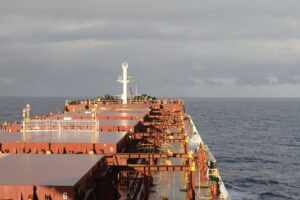For over a decade, the Maritime Anti-Corruption Network (MACN) has gathered first-hand data to map the extent of maritime corruption. By using Nigeria as a case study, the assessment seeks to understand the wide-reaching impact of maritime corruption on low- and middle-income countries.
While detailed accounts of the direct cost of corruption have been documented, a comprehensive assessment of its overall monetary impact on the maritime industry and wider society, including indirect costs such as extended vessel lead times and delays, has been lacking.
This study, developed by Denmark-based specialised research consultancy QBIS, puts a dollar value on the cost of corruption for the private sector, government, and society, taking into account some of the hidden indirect costs resulting from corrupt practices across the maritime supply chain.
Based on the business-as-usual scenario, the cost of maritime corruption to the industry involved in the import of food and bulk products in Nigeria is over $162m per year.
This cost of corruption adds about 15% to the total transport and logistics costs of importing bulk and food products into Nigeria. Per shipment, the cost of corruption is USD 147,000 per import shipment of grain and over USD 178,000 per import shipment of petrol.
“Before 2019, resolving a single bribery case took 7 to 10 days, but current data shows that over 90% of corruption incidents are now resolved within 24 hours by relevant government agencies, with the average resolution time being just 1 to 8 hours. Impressively, 98% of escalated incidents have been successfully resolved, and the remaining 2% have been escalated to authorities to clarify protocols,” notes the study.
With 63% of Nigerians or 133 million people classified as multidimensionally poor, increased import costs due to corruption are therefore likely to reduce their household demand and make essential goods less affordable to the average Nigerian family.
Based on the business-as-usual scenario, the cost of corruption adds about 1-2 percent to the retail prices paid by the customer for grain and petrol. This results in less consumption and less sales and negatively impacts GDP, tariffs collected by Customs, and job creation.
The study claims maritime corruption results in an annual reduction in GDP of $204m, an annual reduction in revenue collected by Customs of $42m, and 235,000 fewer full-time equivalent (FTE) jobs due to less sales and economic activity.
The total economic damage of maritime corruption is likely to be much higher, the study warns.
Bulk imports are estimated to account for around 43% of the total value of imports, with containers accounting for the remaining 57%. If similar costs of corruption apply in container imports as in bulk imports, the economic damage of maritime corruption will more than double according to this study.
As the study highlights, by ‘Saying No’ to maritime corruption, GDP increases by about $130m annually, customs revenue from tariffs increases by $28m annually, and more than 147,000 full-time equivalent (FTE) jobs are created due to more sales and economic activity across the supply chain in Nigeria.



